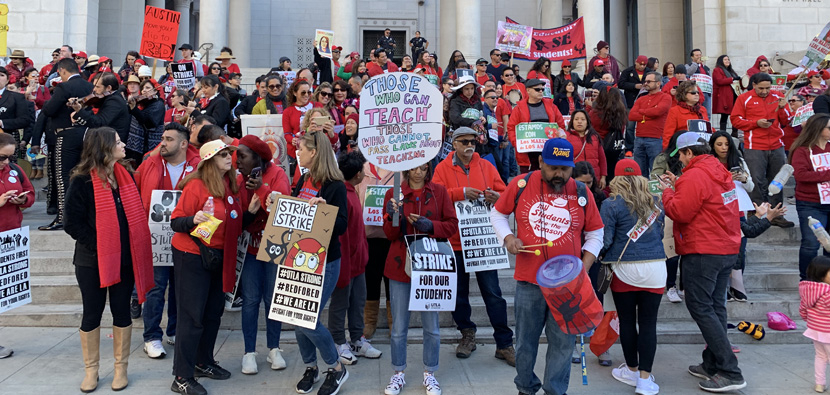Less Messaging, More Action

L.A. teachers didn't need messaging as much as the experience of taking action with others. Photo: Chris Brooks.
You’re at a union meeting, brainstorming for a campaign, when a hand shoots up. “What we need is better messaging. Can we get a billboard? Maybe we could make a meme.”
We’ve all been there. Maybe you’ve said it yourself. It seems like common sense that if we can just find the right words and the correct medium, we’ll win over our fellow workers, or the community, or politicians.
I was frustrated daily by this logic when I was president of the Massachusetts Teachers Association, leading the campaign against a ballot question that would allow for more charter schools.
Members wanted a public relations team to come up with exactly the right message—and then to spread the message for them.
Educators didn’t recognize their own power to communicate why they were opposed to more charters. They thought marketers and campaign managers would know the magic words.
IT WASN’T THE BILLBOARD
Even union members who’ve won a strike sometimes give messaging too much credit for their victory.
Of course it’s important to understand the issues we’re fighting for, and to explain them in a way that inspires other working people to join our fight.
United Teachers Los Angeles, for instance, won because teachers showed how their strike mattered to everyone in the city. But it wasn’t their billboards that conveyed this. The union chose profound issues and fostered genuine conversations between educators and the community. We don’t win by being smarter or more clever in how we say things. We win because we build relationships through conversation and then we take action, putting our collective power to use.
As unions braced for the Supreme Court’s Janus decision, which made the whole public sector “right to work,” I was party to lots of discussion among union leaders about how to prevent disaster.
Experts were brought in to lead focus groups and tell us how we should talk to members and the community. Which term polls better—“workers” or “working people”? Is it best to say “union” or “labor movement”?

SUPPORT LABOR NOTES
BECOME A MONTHLY DONOR
Give $10 a month or more and get our "Fight the Boss, Build the Union" T-shirt.
But I’d wager nothing saved us from a post-Janus apocalypse like the strike wave in the red states. That showed what a union is, better than any slogan could.
And to the degree that union preparation mattered, it was because members talked one on one with their co-workers. The specific words weren’t the point.
TALK TO EACH OTHER
I learned this in a backwards way during the fight against the ballot question in Massachusetts. Members of our union were new to fighting big-money privatizers, and they didn’t trust themselves to talk to voters. They wanted to plant lawn signs and stand out on street corners.
It drove me nuts that they were insisting on such a passive expression of their will. I wanted them to knock on doors and tell voters what educators thought.
Eventually I accepted that people have to start somewhere. But I learned more than “meet them where they are” when I saw that at those standouts, something important was happening.
Members were talking to each other. They told stories. They shouted for cars to honk in support. They shared the pleasure of being cheered for taking a stand. They felt connected and powerful.
The labor movement grows by bringing people together to first name their world, then plan collective action to change it.
“Naming the world” means much more than messaging. It means identifying the structures of power that oppress us, and what we are fighting for, and how we can win.
We don’t need messaging nearly as much as we need the experience of taking action with others. These experiences change us—so we can go on to change the world.




